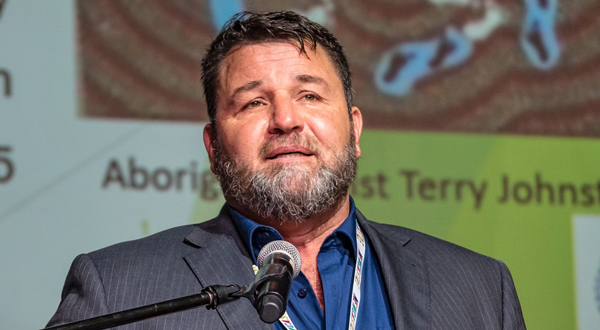
James Charles is a proud Kaurna man who left school at just 14, but he knew deep inside that he wasn’t done with education for good.
However, even he probably wouldn’t have predicted he would return to earn a PhD, launch a successful career as a podiatrist and academic, and be acknowledged for making a real difference to Aboriginal health in Australia.
It shows what determination and belief can achieve.
“I think a core value is to work hard; to always work hard at whatever you are doing,” says the now Dr Charles.
“Everyone has stumbles and falls but you really get judged on how quickly you get back up and I think persistence is super important.”
Born into a loving but underprivileged family in Adelaide, James had a happy childhood but admits to struggling at high school because of difficulties with reading and writing.
He pulled the pin because he couldn’t see the point, then decided to try again when he could.
Aged 27, James walked into the Tea Tree Gully TAFE and applied to take a Year 8 equivalency program as the first step towards university.
“You basically got a stamp to say ‘yes you are illiterate’ because you had to be illiterate to get into that course,” he says.
From there, things took off. Supported by an Australian Rotary Health Scholarship, James enrolled at UniSA to complete an undergraduate podiatry degree, then a Masters and finally a PhD.“
When I first started it was a real culture shock for me. I was a bit older than most of the other students but to be honest it was the time of my life. It was amazing. I absolutely loved it.”
James says podiatry isn’t glamorous but is incredibly rewarding – and it’s an area we all should know more about.
“Feet are such an important part of our lives and we rely on them for mobility but people neglect them until there is a problem,” he says.
“Aboriginal people, especially those in rural and remote communities, are more likely to have foot health problems than in the general population.”
The foot biomechanics of Aboriginal people is different to that of non-Aboriginal people, and during his PhD James found that changing foot structure is one of the causes of poor foot health outcomes that result in high rates of foot amputation in Aboriginal populations.
He has continued this research in his role as a podiatrist and Associate Professor of Indigenous Teaching and Learning at Deakin University in Geelong, while also educating students and health professionals about his findings and how to provide culturally appropriate foot health care.
Last year his dedication and commitment were recognised when he was named the 2017 National NAIDOC Scholar of the Year. It’s an award of which he is particularly proud.
“To get approval from other Aboriginal academics, professionals and community members to say that we’ve heard of what you’re doing and we think that you’re doing a good job is amazing,” he says.
In 2008 James became the inaugural Chair of the Indigenous Allied Health Network, which he helped to create, and has also worked to raise money for a Rotary Indigenous Health Fund that will provide scholarships for others to follow in his footsteps.




